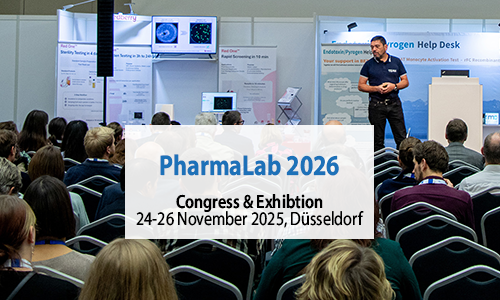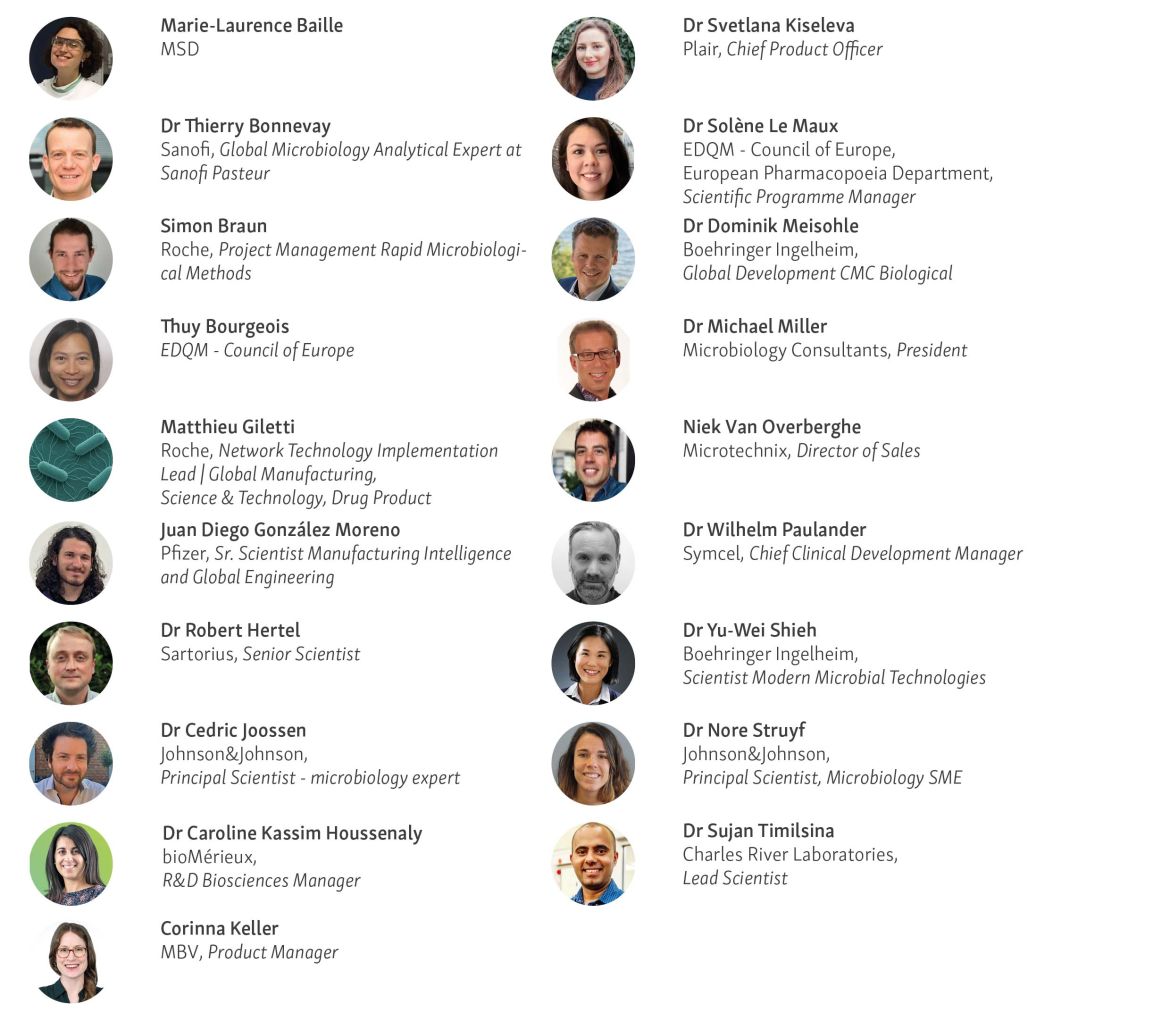Conference: Alternative and Rapid Microbiological Methods
25/26 November 2025
Objectives
In the context of this conference, current developments in the relevant regulations and scientific methods will be presented and, in addition, experiences in the implementation and validation of alternative and rapid microbiological methods will be reported. It will cover applications for in-process control as well as those used in the context of product release. Examples of real-time or online monitoring will also be regularly covered.
This conference will provide an opportunity to discuss the latest advances in technology as well as practical aspects and concerns for meeting regulatory requirements. State-of-the-art presentations by competent speakers from the authorities as well as industrial and academic experts in the field of microbiological detection and identification will provide a comprehensive overview.
Background
Scientific progress in the field of cell and molecular biotechnology has led to the rapid development of biopharmaceuticals, tissue engineered applications and advanced therapy medicinal products. Against this background, the safety of these new technologies, products and applications is becoming increasingly important. An important issue in the context of risk assessment and safety is contamination with microorganisms and mycoplasmas and their detection, prevention and control using rapid and appropriate methods.
Target Audience
This conference is of interest to professionals from
- Biotechnological & Biopharmaceutical Companies
- Contract Service Laboratories
- Academic Research Institutions and Organizations
- Government Agencies
- Cell Culture Collections
- Supplier Detection Systems
with responsibilities in Manufacturing, Quality Assurance, Quality Control, Regulatory Affairs, Research & Development, Process Development and Validation.
Moderation
Dr Sven M. Deutschmann, Roche
Dr Michael Miller, Microbiology Consultants
Congress Registration
Programme
Tuesday, 25 November 2025
 KEYNOTE on 25 November 2025: AI in Pharma: The Hype, The Hope, The How
KEYNOTE on 25 November 2025: AI in Pharma: The Hype, The Hope, The How Dr Marcel Franke, Senior Scientist Predictive Formulation, Process Solutions/Upstream & Process Materials R&D Merck Life Science
- The Hype – Big Budgets, Bigger Promises
- The Hope – A Shift from Trend to Transformation
- The How – data Integrity, Human and Organizaional Readiness and Regulatory Enablement
Update on RMM in the Ph. Eur.
Thuy Bourgeois, EDQM - Council of Europe
- Update on the revision general chapter 5.1.6. Alternative methods for control of microbiological quality
- Update on the certification system project for the validation and comparability of alternative rapid microbiological methods
Vision AI in Microbiology QC: Robust Models Ensure Reliable Outcomes
Niek Van Overberghe, Microtechnix
- Locked-state AI models for compliant microbiology QC
- Rapid model retraining possible based on as few as 200 plates
- False positives significantly reduced; zero false negatives upheld
- Enables fast adaptation to new media or Petri dish changes by vendor
- Workflow can be validated — no more supervisor review required for positive/negative triaging
Unlocking Microbial Strain Typing with Whole Genome Sequences
Dr Sujan Timilsina, Charles River Laboratories
- Results of a study evaluating the typing of microbial strains using a universal set of genes that provided high-resolution results, using complete bacterial genomes that were not limited to individual species
- These conserved genes successfully distinguished bacterial strains, comparable to established species-specific strain typing schemes, paving the way for rapid universal strain typing solutions using bacterial genomes that are not limited to a single species
- This advanced approach to rapid bacterial strain typing overcomes a significant barrier to previous Sanger sequencing methods by eliminating extensive method development processes that involved selecting species-specific housekeeping genes for strain typing
Approach for Validation Microbial Identification Methods: Primary and Lmited Validations
Marie-Laurence Baille, MSD
- Risk based approach to prioritize protocols of validation and other mitigations
- Leveraging of data from a primary validation and minimizing validation at other sites
- Selection of panel and reference methods
- Avoid exceptions and mistakes: anticipate discrepancy of results and make meaningful calculation
Development of Long Read Sequencing for Adventitious Virus Detection
Dr Dominik Meisohle, Boehringer Ingelheim
- Why NGS for Adventitious Virus Detection
- Advantages and Challenges using Oxford Nanopore’s Long Read Sequencing (LRS) Technology
- Method Development: Approaches and Current Status
- Outlook
Next Generation Digital PCR Technology for Sterility Testing of Cell and Gene Therapy Products
Dr Robert Hertel, Sartorius
- A new digital (droplet) PCR based approach for sterility testing
- How to clearly differentiate between the background and positive signals
- User Application data
Rapid, Phenotypic Sterility Testing for Cell and Gene Therapy Products: Validation of a Three-Day Protocol Using the calScreener+ Platform
Dr Wilhelm Paulander, Symcel
- Limit of detection and time-to-detection for microorganisms with diverse growth kinetics, including aerobic, anaerobic, and slow-growing species with complex growth requirements
- Specificity across 30 Ph. Eur., USP, and other relevant microbial species
- Non-inferiority to Ph. Eur. 2.6.1 and USP <71>
- Compatibility with cell and gene therapy manufacturing workflows
Moving the Needle for Sterility Testing: Towards a New, Rapid Sterility Test to Allow Faster Release of CAR-T Drug Products
Dr Nore Struyf and Dr Cedric Joossen, Johnson & Johnson
- The vein to vein (V2V) time for cell therapy products needs to be as short as possible
- To reduce the V2V time to the maximum extent, a rapid sterility test with turnaround time of maximum 3 days is needed
- An innovative rapid growth-based technology relying on biocalorimetry was identified as a possible solution to reduce the turnaround time
- First results with the rapid, alternative sterility method show that a set of different microorganisms can be detected within 3 days at both high and low spike levels
- A full GMP primary validation and comparability study shall be conducted in support of the routine implementation of the rapid, alternative sterility method
Wednesday, 26 November 2025
 KEYNOTE on 26 November 2025: Phage Therapy: History, Current Challenges and Perspectives
KEYNOTE on 26 November 2025: Phage Therapy: History, Current Challenges and Perspectives Dr Frédérique Vieville, CEO, 5QBD-Biotech
- From history to today – rediscovering phage therapy in the context of modern medicine
- Antimicrobial resistance – why phages are part of the answer
- Challenges: scientific, CMC, regulatory
- What lies ahead – opportunities and pathways for integration into healthcare
Update/Additions to Performing Statistical Calculations for Quantitative Rapid Method Validation Criteria
Following on the discussions for applying statistical methods to demonstrate comparability between a qualitative alternative or rapid method to the compendial method (2025 ECA Microbiology Conference), this presentation will highlight the upcoming revised PDA Technical report #33 proposed recommendations for demonstrating comparability for quantitative methods. Various examples of quantitative data sets will be presented, with a focus on selecting the most appropriate statistical models to execute data analysis.
Dr Michael Miller, Microbiology Consultants
- Understand available statistical models for demonstrating comparability for quantitative methods, including Accuracy, Precision, Linearity, Range and Limit of Quantitation
- Match the appropriate statistical models with data sets shared by the presenter
- Perform the analyses and conclude whether the data demonstrate comparability
Evaluation of an Automated Readout of APS
Simon Braun & Matthieu Gilleti, Roche
- Technical background of the VRU (Visual Robotic Unit)
- Automated evaluation of APS Proof-of-Concept results
- Dual use Concept (Visual inspection and APS)
- Validation Concept for Automated APS readout
Evaluation of RMBNucleus™ Mold Alarm Software Feature
Dr Yu-Wei Shieh, Boehringer Ingelheim
- RMBNucleus™ Mold Alarm is an innovative software feature that uses advanced algorithms to enable qualitative mould detection and timely warning of mould infestation
- A study was conducted to test the feature with a known mould and bacteria concentration, examining aspects such as mould detection rate, false alarm rate and false positive rate
- Comparison with conventional monitoring results (parallel study)
- Study results
- Detect microcolonies of mould invisible to the naked eye
- Detection rate
- Suboptimal temperatures
- Conclusions for the monitoring methodology
Automated Solid Phase Cytometry Applications: Bioburden Troubleshooting in Production and Sterility Testing Feasibility for mRNA Vaccines
Dr Thierry Bonnevay, Sanofi
- Principle of Automated Solid Phase Cytometry
- Alternative bioburden testing to support rapid troubleshooting in production (several analyses performed across three different buildings, with concrete examples)
- Potential use in sterility testing as an alternative method (feasibility study on mRNA matrices)
Primary Validation of Rapid-C+, Advanced BFPC, for Real-Time Viable Particle Monitoring
Dr Svetlana Kiseleva, Plair
- Primary validation of Rapid-C+, an advanced biofluorescent particle counter for real-time viable particle monitoring
- Validation results, conducted in accordance with Ph. Eur. 5.1.6, USP <1223>, and PDA TR No. 33
- Comparison to traditional growth-based method for the following parameters:
- Specificity
- Accuracy, Precision, Linearity, Range
- Limit of Detection and Quantification
- Ruggedness and Robustness
- Equivalence
EM Plate Reading Using the APAS Independence
Juan González, Pfizer
- The increase in focus for CCS compliance has driven renewed attention on EM and alternative/rapid methods to provide reliable results with full traceability of records.
- In the Pharma industry, there is a push to adopt Modern Microbial Methods, where their inclusion can improve quality of product and drive lab efficiencies. Pfizers projects to explore how automated colony counters could fit in their operations
- The project with the APAS Independence which is a standalone end-point plate reader using artificial intelligence
- The pilot study with over 6000 samples totalling more than 15000 colonies using the proposed automated method and the current manual method
- A detailed investigation into plate level and colony level detection
- Results and discussion of lessons learned and proposed next steps
Accelerating Release of Short Shelf-Life Therapies Through Automated Growth-Based Method Optimization and Application of USP<72> “Safety Margin” Guidelines
Dr Caroline Kassim, bioMérieux
- USP <72> as opportunity to release their products in fewer than 7 days, by providing guidance on the determination of the required incubation time considering the slowest-growing microorganism plus a safety margin
- Demonstrating how the optimization of BACT/ALERT® 3D DUAL-T incubation conditions can reduce the time required to detect aerobic and anaerobic microorganisms, including fungi
- Using C. acnes, commonly identified as the slowest growing microorganism, to determine the minimum incubation time required as defined by USP<72>
Bridging ISO Standards and ARMM for Effective Air Monitoring
Corina Keller, MBV
- EN ISO 14698 and EN 17141 provide the regulatory basis for validating the physical and biological collection efficiency of portable air samplers, these standards alone may not fully address performance under real-world conditions and ensure robustness of the method
- To address this gap, an extended validation framework that incorporates the additional parameters ruggedness, robustness, equivalence, and specificity drawn from Ph. Eur. 5.1.6, USP <1123>, and PDA Technical Report No. 33 is suggested
- In collaboration with a pharmaceutical manufacturer, this framework was tested in practice. This presentation outlines the integrative framework, describes the experimental design, and presents key results

